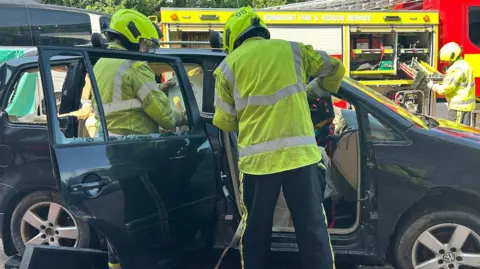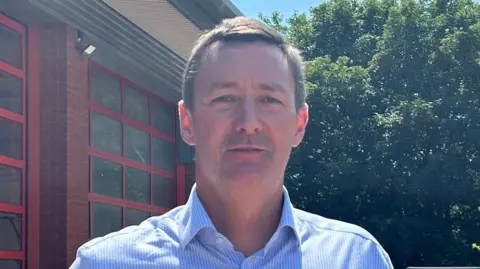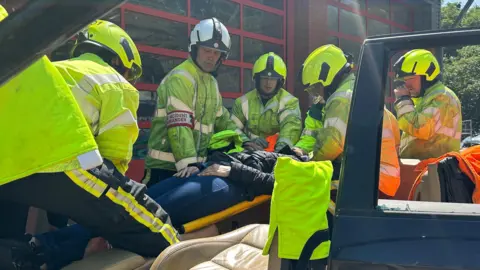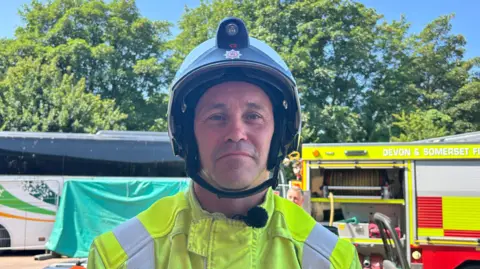Crash rescue technique overhaul to save lives
 BBC
BBCFewer crash victims are being cut free from vehicles since a Devon doctor's research led to changes in national guidance for trauma care.
Prof Tim Nutbeam, from the EXIT (Extrication in Trauma) Project, found more lives could be saved by releasing road traffic victims quickly, rather than traditional methods prioritising reduced spinal movement.
Since his report in 2022, Prof Nutbeam said extrications involving cutting off a vehicle's roof had dropped by more than 50%, and typically saved up to 30 minutes, enabling faster access to life-saving treatment.
He said speed could improve the chances of survival and "slow and steady methods weren't reducing spinal movement – they were just slow".

Insp Ian Harvey, from Devon and Cornwall Police's road policing team, said: "I have sat in the vehicle with a victim talking to them for a long time while the vehicle was made safe.
"It can be very harrowing.
"This is a much quicker, safer and easier process to help people out of the car."
"Traditionally, firefighters have been trained in techniques aimed at minimising spinal movement – despite a lack of supporting evidence that the techniques actually worked ," said Prof Nutbeam, an emergency medicine consultant.
He discovered the rate of spinal cord injury among people extracted from vehicles in the UK was under 0.7% and patients were dying from internal injuries that required urgent attention.
The findings prompted changes to national guidance for both paramedics and fire and rescue services.
Prof Nutbeam, who is also a critical care doctor for Devon Air Ambulance, said: "After a road traffic collision, people often have serious internal injuries."

He said: "Between 15% and 40% of patients are trapped in their cars, and during that time they may be bleeding to death.
"We know that if we get them out quicker, we may improve their chances of survival and recovery."
The EXIT Project conducted 10 studies, including biomechanical testing, patient interviews, and analysis of more than 70,000 trauma cases involving trapped individuals.
"We found that what we were doing historically wasn't working," Prof Nutbeam said.

Greg Webb, watch manager at Exeter Middlemoor Fire Station, said internal injuries from crashes were often hidden but life-threatening.
"A ligament which is attached to the liver can be severed for example if there is a sudden stop and this is the same for the heart.
"We need to get them to hospital as soon as possible. By delaying to protect their C-spine, they are bleeding out and we can't see that on the scene."
He added the new guidance also freed fire crews up to attend other incidents.
Insp Harvey added: "Getting people out of the vehicle should be guided by a professional to ensure it's done safely, but if someone is able to step out of a vehicle with no injuries, then obviously they are going to be safer away from the scene and where the danger lies."
Follow BBC Devon on X, Facebook and Instagram. Send your story ideas to [email protected].
